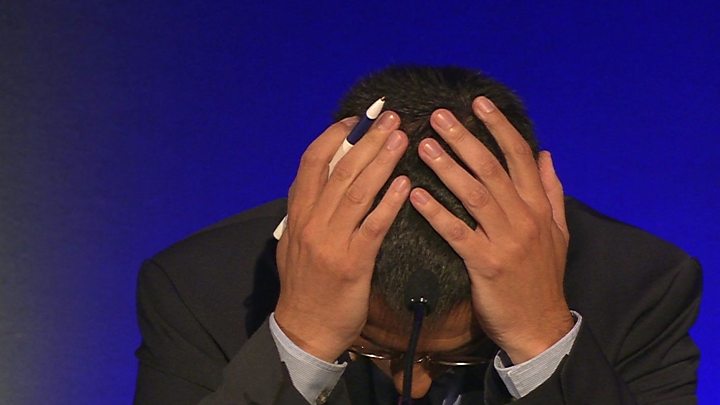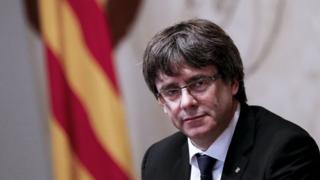Catalan crisis: Puigdemont under pressure over independence bid
Pressure is rising on Catalonia's President Carles Puigdemont over his regional government's drive for independence from Spain.
He had been due to make a statement to clarify his position, but the move has been suspended, officials said.
The Spanish government plans to strip the regional government and Mr Puigdemont of their powers.
Article 155 of the Spanish constitution lets Madrid take control of institutions, police and finances.
Mr Puigdemont declared independence after a referendum on 1 October, which was ruled illegal by Spain's constitutional court. But the Catalan leader immediately suspended implementation, calling for talks.
- What powers does Catalonia have?
- The case for and against independence
The Spanish Senate is set to vote on triggering Article 155 on Friday.
A statement from Mr Puigdemont was expected on Thursday. Large crowds gathered outside the regional government building in Barcelona, with many hoping that he would declare independence.
Skip Twitter post by @BBCkatyaadler
Student pro-independence protestors outside #catalonia government offices shouting: the streets will always be ours! pic.twitter.com/RtXGo2DFel
— katya adler (@BBCkatyaadler) October 26, 2017
Report
End of Twitter post by @BBCkatyaadler
There had also been speculation that he might suspend the drive for independence and call regional elections in a effort to avoid direct rule from Madrid.
But early on Thursday afternoon Catalan officials said the speech had been suspended. They gave no details or explanations.
Local media say that his coalition of pro-independence groups in the regional parliament is under strain.
 Media playback is unsupported on your device
Media playback is unsupported on your deviceThe Catalan government said that of the 43% who took part in the 1 October referendum, 90% were in favour of independence.
On Wednesday Mr Puigdemont sent a letter to the Spanish Senate arguing that the central government's plan to intervene in Catalonia's autonomy was unconstitutional.

